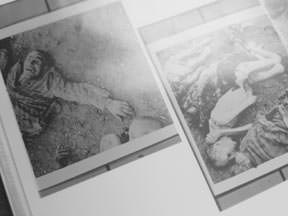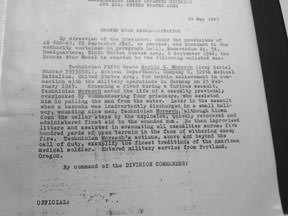 |
||||||||
| Vol. 25, No. 3 • Mailed monthly to over 13,500 homes in the Gateway & Parkrose Communities Free • July 2009 | ||||||||
| MEMO BLOG | Memo Calendar | Memo Pad | Business Memos | Loaves & Fishes | Letters | Home | ||
 |
| Gruesome photos from Mittelbau Dora concentration camp for political prisoners, liberated by Morasch and his fellow troopers April 11, 1945. |
 |
| “Above and beyond the call of duty”: words from Morasch’s Bronze Star Citation. Pretty much sums up his life too. |
The second memory Morasch shared was an event initiated by a chance meeting and a mortal mistake, which propagated a chain of events that spanned generations. The Battle of the Bulge, so dubbed by the shape of the Nazi offensive in relation to the surrounding Allies, began on December 19, 1944. In early January the Nazis started backing out. On January 10, 12 American B-17s dropped 87 500-pound bombs on the wrong side of the river, riddling Morasch’s medical company. Of the 96 medics, six died and 19 were wounded.
“(They were) pretty heavy for friendly fire.” The bombs flattened the room next to Morasch’s, killing (among others) Captain James Bertoglio, who had impressed Morasch at Camp Carson when he stopped on a stroll to introduce Morasch to his wife, who was pregnant at the time. Years later, after starting his own family, Morasch wondered if Bertoglio had lived to hear word of his child’s birth.
In February 1945, for his actions during a “furious assault,” Morasch received the Bronze Star Medal for rendering aid to ten wounded men, and for evacuating them, risking his life in the face of “withering enemy fire.”
After the war, Morasch returned to Portland and, thanks to the GI Bill, obtained a degree in physics from Reed College, where he started dating a woman named Esther. One Friday when Esther’s sister had returned from the Army, he took the sisters golfing. “Saturday night I called again,” Morasch said. “(Esther) said, ‘I can’t go out’ and I said, ‘What’s your sister doing?’ I never went out with the other one again!” That’s Sallie, Morasch’s wife and mother of their six children. “How can you plan those things? Living is fun.”
His business also evolved serendipitously. Morasch worked for seven years as a government physicist at the Bonneville-Ross Substation. One day his brother, who sold freezers, called with a proposition. “He said, ‘I’m selling so many of these freezers, if you and Sallie could buy some (for resale), I could give you $30 extra for each one.’ So I went out and bought ten freezers. We made $900.” Morasch partnered with his volatile brother for 18 months before the two split, his brother liked the bottle more than business. “Now all of a sudden, I have a little business and I don’t know how to spell ‘business’!” he said.
His sales pitch involved stocking the freezer with food, which Morasch sourced from Hawthorne Lockers. “After a while I got a little smarter and realized in the food business, you can sell them food four times a year. In the freezer business, you can only sell them a freezer once in a lifetime.”
So he started Morasch Meats, which has processed and packed meat for the past 53 years. Originally located in a little office on 147th Avenue and Stark Street, the company moved to its current location at 4050 N.E. 158th Ave. in 1980. It has expanded four times since and now occupies 80,000 square feet and employs 65 people. Four of Morasch’s children currently run the business, but all six have been involved, including five of his 12 grandchildren.
“I don’t do any work, but I come down to cause problems six days out of the week. If you love what you’re doing, it isn’t work,” Morasch said. “You’re successful if you can make enough money so you’re happy living on what money you make.”
Successful by most standards, Morasch never forgot the kindness Captain Bertoglio had shown to him, a lowly private, that day long ago at Camp Carson. When 20 veterans and their 35 family members revisited Belgium, the Netherlands and Germany in October 2004, Morasch penned a eulogy he planned to recite at Captain Bertoglio’s grave. After a celebratory welcome in the Netherlands that featured a 200-vehicle parade spanning over a mile long, the journey came to Bertoglio’s cross in Maargraten, Germany. “I was going to be macho and stand over his grave. I bawled like a baby.” His daughter Melissa also choked up, so the 14-year-old granddaughter of a fellow veteran read the eulogy. Yet when Morasch noticed that the grave cited Montana as Bertoglio’s home state, it revived his question concerning his child. Morasch’s daughters took up the cause and started researching Bertoglios in Montana. After several calls, they located a cousin, whom they recruited in the pursuit to locate Bertoglio’s widow, but to no avail. They eventually found the whereabouts of his sister, who unfortunately had died just the year before. Her son, however, furnished the missing link. He knew of his cousin, who was born a little over a month after her father died. Morasch contacted her, shared what he knew of her father, found out she had visited her father’s gravesite, enabling him to put the mystery to rest.
The annual Timberwolf reunion will take place in Portland this year, the third time the city has held the honor and most likely the last, as the group has dwindled. Local members also meet twice annually, most recently at the Refectory last April when 59 veterans and family met for a luncheon. In July, local members usually stage a picnic at Camp Withycombe, but due to camp renovations, Morasch’s son may open his home to the event, which draws roughly 100 people.
As for his future plans, Morasch jokes, “Now all I have to do is find another wife.” Sallie Morasch died in October 2007 after 60 years of marriage. “I’m not looking; God will send me one.” Morasch has strong faith in Providence. “I wanted to marry a girl when I was 19 and my mother said no. I listened to my mother. She was a beautiful girl but it wasn’t there, so then God sends me a perfect one in a funny way, and I said OK, you stopped one, and you gave me one and you took her back. Now you owe me one, so now get (on) with it.”
Morasch is currently reading the Bible for the 95th time. Sixty-five readings ago he decided, “It would be nice if I could read the Bible as many times as I have (years of) life. Well, I’m 86 and I’m on my 95th time, so I’m ahead of God now.” Contrary to finding it redundant, Morasch pointed out, “The words never change, but the meaning changes. Because wherever you are emotionally, when you read that passage it will fit what your emotion is now. That’s why you can read it, and I can read it, and he can read it, and we come up with three opinions. To say that we all have to agree? No. God gives you each a different viewpoint. This is what we also say in getting into discussions: What I said, and what you heard and what I meant are three different things.”
Lasting advice from Morasch: “When you get smart enough to realize that God knows what He is doing, don’t trust man’s opinion. When you are young, you can’t believe that; (you think) miracles don’t happen. Yes, miracles do happen.” Here’s hoping more fun, miracles and stories come Morasch’s way.
 |
 |
 |
 |
MEMO Advertising | MEMO Archives | MEMO Web Neighbors | MEMO Staff | Home